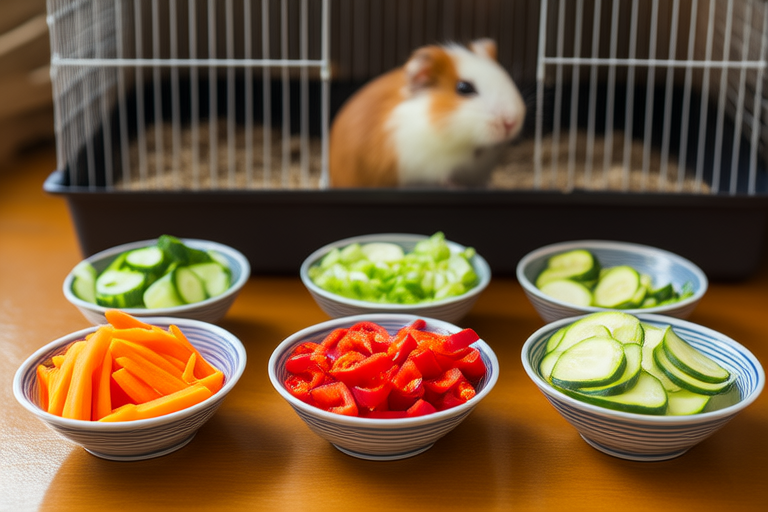The Best Treats for Your Guinea Pig That Won’t Spoil Their Tummy
Guinea pigs are delightful companions known for their charming personalities and gentle demeanor. However, as a responsible pet owner, it’s essential to understand their unique dietary requirements to ensure they lead healthy, happy lives. Proper nutrition is vital for your guinea pig’s overall well-being, and selecting the right treats can be both enjoyable and beneficial for them.
Understanding Guinea Pig Dietary Needs
Guinea pigs have specific nutritional needs that must be met daily. They require a diet rich in vitamin C, fiber, and other essential nutrients. Unlike humans, guinea pigs cannot produce their own vitamin C, making it necessary to provide this through their food. A balanced diet primarily consists of hay, fresh vegetables, and a high-quality guinea pig pellet. While fruits and certain vegetables make excellent treats, it’s crucial to offer them in moderation to prevent digestive issues.
Safe and Nutritious Treats for Your Guinea Pig
Choosing the right treats is key to keeping your guinea pig healthy and happy. Here’s a list of safe and nutritious options:
- Vegetables: Dark leafy greens like kale, spinach, and romaine lettuce are excellent choices. Other safe vegetables include carrots, bell peppers, cucumbers, and zucchini. These provide essential vitamins and minerals while offering variety in texture and flavor.
- Fruits: Fruits are a tasty treat but should be given sparingly due to their sugar content. Apples, blueberries, strawberries, and bananas are popular favorites among guinea pigs. Always remove seeds and pits before feeding.
- Hay: While not a traditional treat, providing different types of hay such as timothy, orchard grass, or oat hay can stimulate their interest and add some excitement to their daily routine.
- Herbs: Safe herbs like basil, dill, parsley, and cilantro can be offered occasionally. Herbs not only add variety but also provide additional nutrients.
- Commercial Treats: There are numerous commercial treats available specifically formulated for guinea pigs. Look for those made with natural ingredients and minimal additives.
Portion Control: The Key to Preventing Tummy Troubles
While treats can be a delightful addition to your guinea pig’s diet, overindulgence can lead to digestive issues and obesity. It’s important to practice portion control to maintain their health.
- Limit the Quantity: Offer no more than one teaspoon of treats per day. This small amount ensures that your guinea pig receives the necessary nutrients without compromising their main diet.
- Vary the Selection: Rotate different types of treats to keep your guinea pig interested and to prevent them from becoming too attached to any single type of food.
- Avoid Processed Foods: Steer clear of processed snacks that may contain artificial flavors, colors, or preservatives. Opt for natural, whole foods instead.
Signs of Tummy Trouble: What to Watch For
Despite your best efforts, sometimes your guinea pig might experience digestive issues. Recognizing the signs early can help you address problems promptly.
- Changes in Appetite: If your guinea pig suddenly shows little interest in eating or seems overly eager for treats, it could indicate discomfort.
- Diarrhea or Constipation: Loose stools or difficulty defecating are red flags that warrant immediate attention.
- Lethargy: A normally active guinea pig becoming sluggish or unresponsive is a sign that something might be wrong.
- Bloating: An unusually large belly or discomfort when touched can signal bloating or gas buildup.
If you notice any of these symptoms, consult a veterinarian immediately. Early intervention can prevent more serious health issues.
Practical Tips for Selecting Treats
Selecting the right treats involves more than just picking safe foods. Here are some practical tips to ensure you’re making the best choices for your guinea pig:
- Choose Freshness: Always select fresh, unwilted vegetables and fruits. Avoid anything that looks moldy or has been sitting out for too long.
- Introduce New Foods Gradually: Introduce new treats slowly to monitor how your guinea pig reacts. This helps identify any potential allergies or sensitivities.
- Monitor Reaction: Pay close attention to how your guinea pig responds to new treats. Some guinea pigs may love a particular treat, while others might not show much interest.
- Consult a Vet: If you’re unsure about a specific food item, don’t hesitate to ask your veterinarian for guidance.
Avoid Common Pitfalls in Treat Selection
There are several common mistakes pet owners make when choosing treats for their guinea pigs. Being aware of these pitfalls can help you avoid unnecessary health risks:
- Overfeeding Sugary Foods: Excessive consumption of sugary fruits like grapes and melons can lead to weight gain and dental problems.
- Feeding High-Calcium Vegetables: Too much calcium-rich food like broccoli or kale can contribute to bladder stones.
- Avoiding Dairy Products: Guinea pigs lack the enzymes to digest dairy products, so it’s best to avoid milk, cheese, and yogurt.
- Ignoring Hydration: Ensure your guinea pig has access to fresh water at all times. Dehydration can exacerbate digestive issues.
Conclusion: The Importance of a Balanced Diet
Maintaining a balanced diet is crucial for the health and happiness of your guinea pig. By understanding their dietary needs and carefully selecting appropriate treats, you can enhance their quality of life. Remember, treats should complement their primary diet of hay, pellets, and fresh vegetables rather than replace them. A well-rounded, nutritious diet will help your guinea pig thrive and enjoy a long, healthy life.
